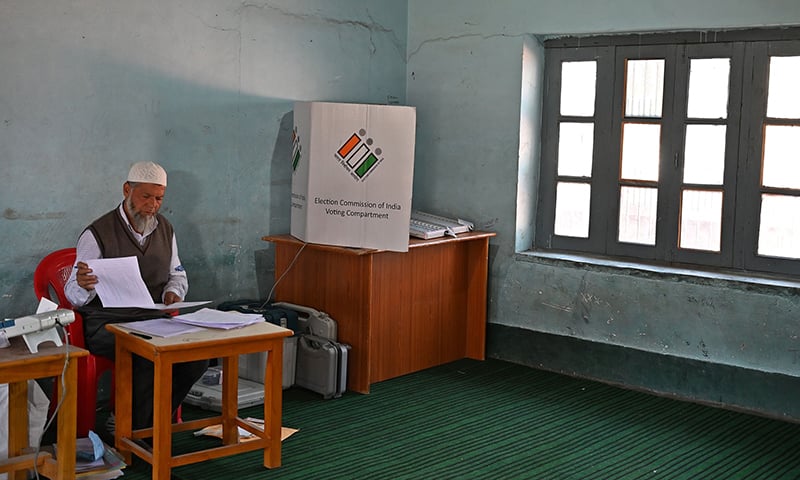Shortly before India's mammoth elections began in April, New Delhi did something unprecedented ─ it banned civilian traffic on the only major highway connecting the heart of Indian-occupied Kashmir (IoK) with India.

The government cited unspecified security threats for the twice-weekly ban, but the move is symptomatic of the heavy handed approach Indian Prime Minister Narendra Modi and his Hindu nationalist Bharatiya Janata Party (BJP) have taken in the occupied region since taking power in 2014.
Gone are the carrot-and-stick methods of previous governments that saw ─ at least ─ attempts to win the hearts and minds of Kashmiris as a key part of maintaining security in the Muslim-majority occupied territory.
Modi's government has, instead, given the military a free hand to counter resistance to Indian rule, which means it has taken aim not just at freedom fighters but also regular citizens supporting the freedom cause.
Although deeply unpopular in Kashmir, the BJP's campaign has resonated in India, where few other issues see broad consensus than the idea that IoK must remain part of India at any cost.
Modi capitalised on the Pulwama attack by sanctioning aerial incursions into Pakistani air space, ostensibly to bolster a campaign slogan claim that he is India's 'chowkidar' or watchman.
And when the first phase of voting in India's five-week election kicked off in Kashmir on April 11, it came amid a sweeping crackdown with police arresting hundreds of Kashmiri leaders and activists.
Among the districts voting in India's fifth phase on Monday (today) are Pulwama and Shopian in southern Kashmir. The election concludes May 23.

The crackdown has been good optics for the BJP's base across India. And Modi hasn't had to worry about losing votes in Kashmir, where there are just six seats and turnout has historically always been low as Kashmiris regard Indian elections as an illegitimate exercise carried out under military occupation.
"Modi and his party have waged a war against the people of Kashmir," said Nazir Ahmed, a trader in the outskirts of Srinagar. "This election doesn't matter in Kashmir. But Kashmir matters for the election in India."
Modi repeatedly cites the airstrikes after the Pulwama attack as evidence of his tough, uncompromising stance on Pakistan. "India has quit the policy of being scared of Pakistani threats," Modi claimed at a recent election rally.
Further efforts to project Modi and the BJP as India's protectors were made in billboards that went up across the country featuring Modi, BJP President Amit Shah and IAF pilot Wing Cmdr Abhinandan Varthaman, who was captured by Pakistan during the February skirmish and given a hero's welcome when Pakistani forces returned him to India as a gesture of peace two days later.
India's Election Commission had to take the unusual step of asking parties not to use photographs of soldiers in campaign material.
"Optics matter a lot to Modi and his BJP. Be it surgical strikes, or killing militants or jailing separatists or clamping down on resistance groups, they are more of a well-oiled PR machine. They won't do anything quietly even if doing so has proven to be effective in the past for other parties," said Amit Kumar, a political historian in Srinagar.
BJP leaders say the party has been pursuing national objectives and refuted being unfairly tough on Kashmir.
BJP leader Kavinder Gupta believes that "If you want peace in Kashmir, the army needs to have a free hand."
Critics believe Modi and his party are using anti-Kashmir and anti-Pakistan sentiment to pivot away from his economic record and other issues such as youth unemployment and farmer suicides.
Initially, the anti-India movement in IoK was largely peaceful but after a series of political blunders, broken promises and a crackdown on dissent, Kashmiris launched a full-blown armed struggle for freedom in 1989.

The territory continues to be one of the most militarised regions in the world and most residents favour an end to Indian rule. At least 70,000 people have been killed in the conflict in the last three decades.
Militarisation has only increased under Modi, and soldiers now fire pellet guns that routinely maim and blind protesters, and blow up residential homes with explosives during counter-insurgency operations.
Kashmir has been so central to Modi's strongman narrative that even unpopular economic policies have been justified by his government as being necessary for national security.
Modi introduced demonetisation to take 1,000 and 500 rupee notes out of circulation, disrupting business and forcing millions of people to stand in lines to change out their suddenly-worthless bills, as a measure to curb black market money.
The Central Bank later said the measure had mostly injured India's poor.
But Modi and his Cabinet colleagues defended it as a way to stop "terror" funds reaching Kashmiris.
While campaigning, Modi and other BJP leaders have also cast their party as the antithesis of their main opposition, Congress, which ruled India for about half a century starting from independence.
Modi repeatedly accuses Congress of being soft on Pakistan, soft on terror, pandering to Muslims for votes and pampering Kashmiri fighters.
But experts say Congress statecraft had carefully calibrated ways to keep dissent in check through a strict surveillance regime, while maintaining an air of democracy working in IoK.
"Once in power BJP realised that those gaps were actually deliberately placed safety valves allowed to give vent to Kashmiris. With nothing else to show, they are going after these safety valves one after another," said Kumar, the historian.
"They've little time to bother for the long-term consequences of their muscular approach on Kashmir as long as it helps them consolidate power nationally in (the) short term," he said.















































